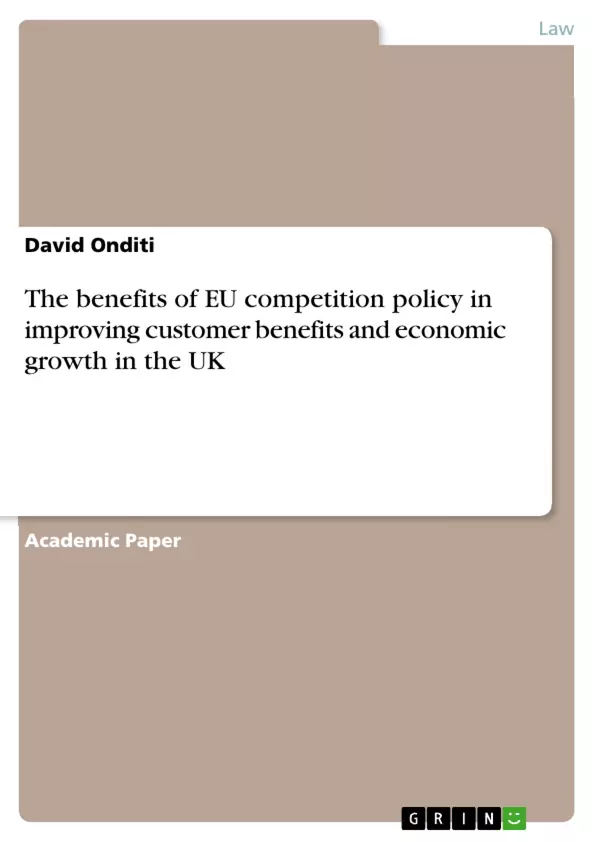The paper explores the competition policy of the European Union, by exploring the benefits of the liberalization to the UK's customers and economic growth. The European commission seeks to ensure that the businesses offer the best possible prices for the best possible products. The commission ensures that the market is functioning well by correcting or preventing anti-competitive behaviour through monitoring agreements between companies that seek to restrict the competition. The commission also monitors mergers and abuse of a firm’s dominant position.
Inhaltsverzeichnis (Table of Contents)
- BENEFITS OF EU COMPETITION POLICY AND LIBERALISATION IN IMPROVING CUSTOMER BENEFITS AND ECONOMIC GROWTH
- ANALYSIS OF INDICATIVE DATA SAMPLE AND THE ACHIEVEMENT OF THE COMPETITION POLICY
- OLIGOPOLY THEORY AND THE EU COMPETITION POLICY
- CONCLUSION
Zielsetzung und Themenschwerpunkte (Objectives and Key Themes)
This essay examines the benefits of EU competition policy and liberalisation in improving customer benefits and economic growth. It explores the objectives of EU competition policy, including increased customer choice, competitive pricing, economic and corporate growth, improved service quality, and innovation. The essay then analyzes the effectiveness of the policy in the energy, air transport, and telecommunications sectors using indicative data, considering factors such as price fluctuations and market trends.
- Benefits of EU competition policy for consumers and economic growth
- Analysis of the effectiveness of competition policy in specific sectors
- The impact of oligopoly theory on competition policy
- Challenges to effective enforcement of competition policy
- Potential implications of Brexit on EU competition policy
Zusammenfassung der Kapitel (Chapter Summaries)
- The first chapter introduces the objectives of EU competition policy and highlights its role in promoting consumer benefits and economic growth. It emphasizes the importance of ensuring fair competition, preventing anti-competitive practices, and fostering innovation.
- The second chapter analyzes indicative data from the energy, air transport, and telecommunications sectors to assess the effectiveness of EU competition policy in achieving its objectives. It examines price trends, market competition, and the impact of factors like oligopoly theory.
- The third chapter delves into the complexities of oligopoly theory and its influence on competition policy. It explores the strategies employed by companies in oligopolistic markets and discusses challenges arising from market dominance and collusion.
Schlüsselwörter (Keywords)
The key terms and focus topics of this essay include EU competition policy, liberalisation, customer benefits, economic growth, anti-competitive behaviour, oligopoly theory, price trends, market analysis, and Brexit implications.
Frequently Asked Questions
What are the main goals of EU competition policy?
The policy aims to ensure fair market functioning by preventing anti-competitive behavior, monitoring mergers, and stopping the abuse of dominant market positions to benefit customers.
How does competition policy benefit consumers?
It leads to better prices, increased product choice, improved service quality, and higher levels of innovation in sectors like energy and telecommunications.
What is oligopoly theory?
Oligopoly theory examines markets dominated by a few large firms. Competition policy monitors these markets to prevent collusion and ensure that these firms do not restrict competition.
Which sectors were analyzed in the UK context?
The essay specifically analyzes the impact of liberalization and competition policy in the energy, air transport, and telecommunications sectors in the UK.
What are the potential implications of Brexit on this policy?
The paper discusses how Brexit might change the enforcement of competition rules and the potential challenges for the UK in maintaining competitive market standards outside the EU framework.
- Quote paper
- International Business Management David Onditi (Author), 2019, The benefits of EU competition policy in improving customer benefits and economic growth in the UK, Munich, GRIN Verlag, https://www.grin.com/document/916691



